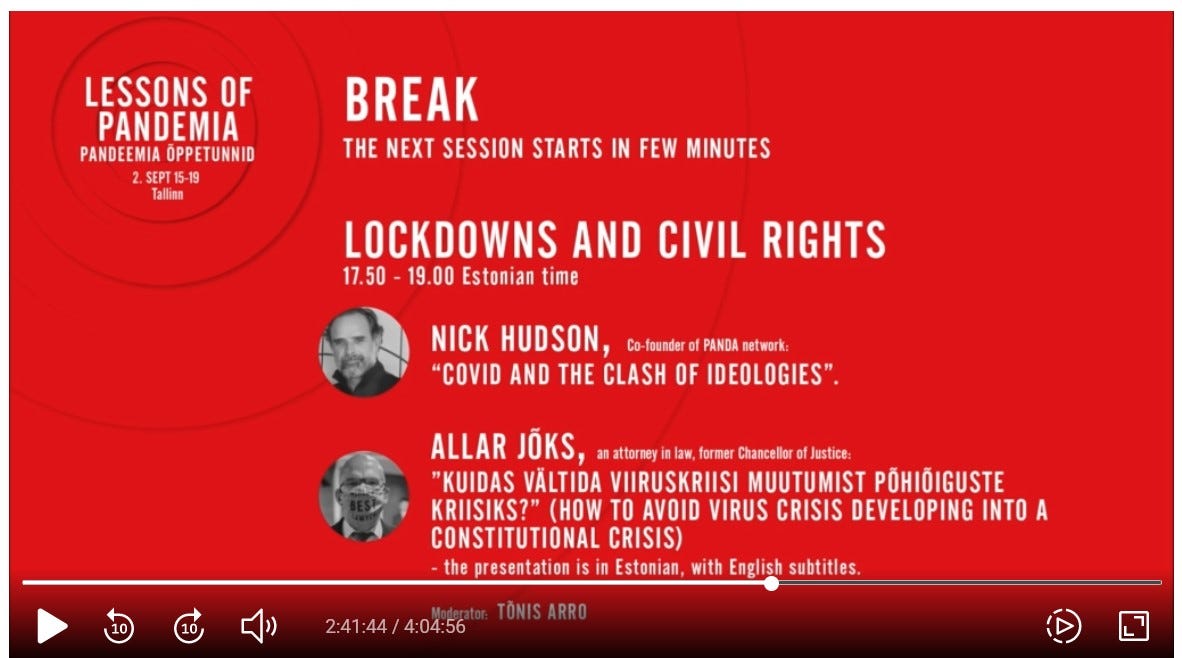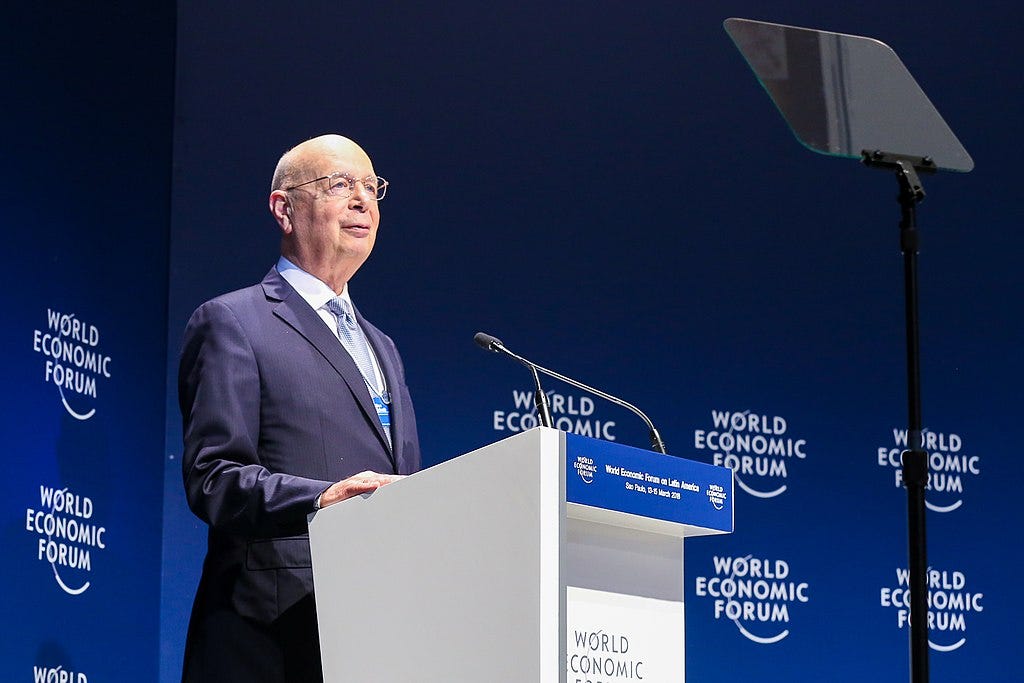Nick Hudson and His Thoughts on the Cult of “Trust the Science” and the Stupidity of the Davos Elite
In a recent interview with us, Nick Hudson, founder of PANDA, pointed out the similarities between Covid and climate change narratives and shared his views on the globalist elite of Davos.
The article is largely based on a recent podcast with Nick Hudson, which you can access here.
How to know that you are dealing not with the facts, but a true scam? Nick Hudson has a really simple answer: “If there are three things happening, then you know you are dealing with a scam. If something is presented as a global crisis, admitting only global solutions and in an environment where dissenting voices are cancelled. If those three things are present – global crisis, global solution, censorship of dissenting voices – then you are definitively dealing with a scam. No exceptions.” Have you noticed any topics lately where these assumptions are met?
A conference and an article in an academic journal
I first heard about Nick Hudson when an acquaintance of mine, Tõnis Arro, organised a conference on Covid in Tallinn, Estonia, in early September 2021, called 'Lessons of pandemia'. It was a high-profile event. Speakers included world leaders in their fields, such as Sunetra Gupta, a professor of theoretical epidemiology at Oxford University, and Martin Kulldorff, a biostatistician and professor of medicine at Harvard University. In October 2020, together with Stanford University professor of medicine Jay Bhattacharya, they had published the Great Barrington Declaration, which recommended focus-protection of at-risk groups of Covid and letting others continue with their normal life, rather than enforcing 'lockdown' policies, so as to avoid major societal harm. Although, and more so in hindsight, this seems an eminently sensible approach, the publication of that view did not endear the scholars to the public – we have previously noted in our articles on freedom of expression and academic freedom how they suffered censorship and stigmatisation as a result.
Other speakers at the same conference organised by Arro included Irja Lutsar, a professor of medical microbiology at the University of Tartu who then chaired the Estonian Scientific Council, Allar Jõks, former Chancellor of Justice of Estonia, Paul Dolan, a professor of behavioral sciences at the London School of Economics, and others.
One of the presenters was Nick Hudson, an investor and entrepreneur from South Africa, who presented a thorough critique of government policies for controlling and containing the spread of the coronavirus and discussed its ideological and political background. Arro had at some point discovered Hudson and the research group he led, PANDA (Pandemics - Data & Analytics), and had been following their critical analyses of Covid policy for some time. By the time the conference took place, they had already co-authored an article realistically assessing Covid as a disease and its severity, which had been published in September 2021 in the Estonian academic journal “Akadeemia”. It was a work based on an earlier presentation by Hudson, which Arro and the third co-author, Annar Alas, had supplemented and placed in a context suitable for Estonia.

Although Arro informed me of the conference at the time, I missed it due to other work. I did, however, carefully read the article by Hudson, Arro and Alas. And, to be honest, I looked even more closely at Irja Lutsar's commentary on the article. Since the article contained statements that were declared heretical in the mainstream, one can assume that the editors of the journal had asked Lutsar to comment for the sake of balance as she was heading the most prominent group of scientists during the pandemic – the one advising the government. Every country and government had such prominent scientific advisors at the time and their opinions were published in the news non-stop.
In their article, Hudson, Arro and Alas essentially made the case that, based on the available evidence, there is nothing new or particularly dangerous about coronaviruses in the world, in other words, countries have clearly overreacted by shutting down societies and restricting individual freedoms in order to contain its spread. And Lutsar? She basically began every paragraph in her commentary article with the words: “I agree with the authors.” Yes, she had a number of points she disagreed on – e.g. she disputed the efficacy of ivermectin, a drug primarily used against parasites, against the coronavirus. She still disputes it, even though there are a number of evidence-based studies that have been published and say otherwise.
However, the basic facts about the virus published by the authors of the article were confirmed by Lutsar. For example, she pointed out that the infection fatality rate (IFR), which takes into account deaths from all infections, is 0.5% for influenza, as was previously assumed, while the calculated IFR for SARS-Cov-2 is 0.3%, or lower. John P. A. Ioannidis, a renowned Stanford University professor of medicine, whose work Lutsar cited in her commentary at the time, later calculated (in the later months of 2022) the pre-vaccine IFR for the 0-69 age group to be actually just 0.095%.
Lutsar also noted that she broadly agreed with the authors' 'positive agenda', which called for isolating sick people, protecting at-risk groups, and following hygiene rules, but not imposing 'lockdowns' and mandates.
Any sensible person reading this would have asked why the head of the Scientific Council did not recommend this positive programme and did not talk about it more widely in the mainstream news? Because let's recall the context – in the autumn of 2021, young healthy people in many workplaces all around the world, including Estonia, were mandated to vaccinate under a threat of dismissal, vaccines were pushed even on children, everyone was forced to wear masks and finally unvaccinated people were banned from many public spheres of life, even if they presented a negative test for the virus. In Estonia, there was no wider debate about the reasonability of these rules, neither by Lutsar nor anyone else at the Scientific Council, and those who raised questions faced being labelled irresponsible anti-vaxxers, if not Putinists.
That was the context which we lived in, and I remember just wanting to scream after reading these articles from the journal.
The cult of “trust the science”
Hudson's realisation that the logic of pandemic politics was all wrong had come much earlier. Hudson is an actuary by education and profession. He is an entrepreneur with long experience in the financial sector and a successful investor. But he is also a critical thinker with a large network of contacts, a wide readership and a wide range of interests. When the so-called Covid crisis began, he started to critically assess the related numbers as soon as in 2020. He says that looking at how national governments were responding to the disease outbreak, he felt something was terribly wrong. "I was looking at the data and coming to a completely different conclusion from what was being said in the media, by the government and public health circles. And I was battling to sleep. It was weighing on me heavily and then a friend of mine said that as long as you stay silent you won't be able to sleep. And then I decided to speak out," he says.
Couldn't he just 'trust the science', as many others were told to do and did? Hudson says that science has nothing to do with trust. Science is about hypothesising and making a critique of these hypotheses. It is about respecting differences of opinion and debate. If there is none, or if it is suppressed, it is not science, it is religion. Perhaps 'trusting science', in his words, means something like this – participating in a religious cult.

Methods such as locking down the societies, and later similarly the vaccine and mask mandates used to combat the spread of the virus under the guise of 'science' had nothing to do with science, Hudson points out. "It was clear from the start that our public health people and the World Health Organization and the bill gateses of the world were speaking absolute nonsense. They weren't rooted in science, they weren't rooted in the scientific method. They were propelling a narrative that suited them for a variety of reasons, both commercial and political," he says.
On the other hand, most people still agreed with these totally unscientific methods, stripping them of their personal freedoms. Hudson is not very surprised. Propaganda has proved effective throughout our history, he says, and he doesn't blame people for submitting to it. "The majority of people just go along with what they're told. A more interesting question is why did governments adopt a set of policies that were so obviously harmful at a population level. It was their decision to embark on the propaganda exercises and the behavioral science manipulations that they used to put people in this position of supporting lockdowns and mask mandates and injection mandates and all of this nonsense," he says.
"Misinformation doesn't mean you say something false."
The reasons for implementing all this were different, Hudson says. Commercial gain and selling their products was important to pharmaceutical companies, and it did not matter whether their products were safe and effective or not. All kinds of testing laboratories and mask sellers earned their share. Power was important for the politicians, including power over the press, where messages could be freely disseminated and controlled. Health officials were given the opportunity to stand out and be important. In the case of scientists, there were those who also enjoyed the limelight and those who depended on the grants that were handed out to the ones who parroted 'proper science'.
At the same time, transnational organisations had long been busy preparing for such events. International training courses – in fact, according to Hudson, indoctrinations – were organised to train tens of thousands of health officials and doctors, as well as politicians and journalists, that the response to the pandemic must be one of the lockdown policies and coercive measures while fighting so-called misinformation. "You're not going to find them in the textbooks of public health. They run straight in the face of everything that's been said about public health for 100 years or more. These are ideas that kind of emerged in the parallel society of people who organised these planning events and simulations," Hudson says, pointing specifically to the concept of “misinformation”, or plainly censorship, as particularly damaging to the society. "Misinformation doesn't mean you say something false. It means that you say something that contradicts an authority, which is a fundamentally unscientific notion," he adds.

This kind of censorship is, of course, a familiar theme for Hudson personally. He began to speak out and interact with others who were similarly critical about the unfolding events. In April 2020, they formed their research group, PANDA, to provide fact-based information, which was countering government messages propagated to the public and they thereby presented a critical view of the methods used to control the spread of the virus. In their first research, they assessed the supposed benefits of the "lockdown" policy and compared it with the resulting harm that was due – the indirect mortality and other undesirable consequences of closing down the economy, schools, medical care, etc. “We calculated, using very conservative assumptions, that lockdowns would have a mortality impact that far outstripped that which we thought at the time might emanate from the virus. As it turns out we were wrong. We were grossly overestimating the mortality from the virus. I think it's now fair to say, based on the meta-studies that have been done on covert mortality, that it's a virus that has negligible impact on the mortality of even vaguely healthy people under the age of 70 and would probably have had no impact on anybody at all if there hadn't been a whole raft of very destructive public health policies and medical policies adopted," Hudson says.
As PANDA and Hudson received considerable attention for their messages, they expectedly had to deal with considerable censorship pressure some time later. For example, YouTube removed a video in which Hudson spoke critically about the lockdown policies. The platform is still issuing warnings to anyone who publishes interviews with him. He has also experienced personal and professional attacks but says he is wealthy enough to defend himself against them. However, he points out that doctors, for example, who similarly disagreed with all this, were witch-hunted and banned from practicing, and in fact had little or no means of defending themselves. In essence, dissenters were silenced.
Climate alarmism as a scam
This brings us back to the beginning of the article, to Hudson's simple formula for detecting a scam – talk of a global crisis, with only global solutions, and all the while silencing dissent. Alongside the Covid pandemic, this formula is also suitable for analysing the other big issue of the day: everything that has to do with climate change. In other words, presenting climate change as an all-consuming crisis is, according to Hudson, a scam. Above all, he says, it is worth reflecting on the claims that need to be true in order to justify the draconian measures being proposed and implemented to combat climate change. Firstly, you have to believe that global warming is happening. Secondly, it must be believed that it is caused by human CO2 emissions. Thirdly, we need to believe that the warming will be disastrous. Fourthly, it must be believed that of the methods proposed, none are less restrictive of life and the economy – the abandonment of fossil fuels being the most significant of them. However, this includes all the other major and minor restrictions on, for example, the movement of people, animal husbandry, etc. And finally, fifthly, we need to be sure that the methods proposed and implemented actually work to prevent or slow down the said climate change.

However, all of this is ridiculous in many respects. "I don't think there are many people who contest the idea that from a certain measurement date, we can talk about global warming. From something like 1960, there's been some degree of warming underway. Certainly, over longer time frames, there's no argument to be made for global warming," Hudson notes. Historically, the climate has fluctuated on a much larger scale, and the CO2 levels in the atmosphere, which have been made the root of most evil, are actually much lower than historical levels. "It would probably be accurate to say that we are going from dangerously low levels of CO2 towards optimal levels of CO2. And although there will be places that are potentially negatively affected overall, we should see a greening of the planet and more beneficial conditions for growing food to support a growing population," Hudson says.
According to Hudson, in the short term, we may indeed see a slight warming of the planet, but the impact of human activity on this is certainly debatable. He says we are being presented with simplistic models of global warming similar to the one used for Covid. To take the notion of systems as complex as a society or the global climate being analysed using spreadsheets on rudimentary measurements seriously, and from that, build assumptions to control those systems and save us from some imagined disaster, requires enormous faith, Hudson notes. "To me, it is manifestly clear from the structure of the discussion that the climate change crisis is a scam," he says. Hudson adds that this becomes even clearer when you talk to the many scientists who have been cancelled for disagreeing on the climate issue – for they can explain that the idea that anthropogenic CO2 emissions somehow dominate all the CO2 generated and circulating on Earth and that CO2 levels somehow having a special effect on global temperatures, is dubious. "The last five ice ages occurred at times when the CO2 level was much higher than it is today. So you know there are all sorts of questions which are simply not brought to the public's attention because it doesn't suit the promoters of this crazy agenda," Hudson notes.
Moreover, a rule of thumb for the climate change doomsday narrative is that its hardest advocates are also among its greatest beneficiaries. They are the ones investing in renewable energy projects, or in technologies to capture CO2 directly from the air, and so on. And much of this is done with taxpayers' money. Hudson points out that as an investor he invested in renewable energy some 20 years ago and says that the money they made came from government subsidies. He says the effort it took to put up the solar farm, from manufacturing the panels to transporting and assembling them, actually cost more energy than the farm produced during its useful life. Hudson says there has certainly been some progress in that respect in the last 20 years, but probably not enough to justify abandoning everything else. "I think the case would be pretty grim if the calculation was done properly. It may be somewhat positive, but it's certainly not a wise way to run around deploying resources to that, especially when we can't be sure that the fossil fuels are as harmful as people claim they are and when we haven't taken the project of making nuclear more efficient and cheaper seriously enough," he explains, adding that the developing world in Africa, Asia and Latin America in particular needs to increase energy production, not reduce it, as they are being urged to do and as some governments are already doing. Less energy means more death and disease, says Hudson. In addition, behind the so-called renewable energy production and the green deal, there is a clearly damaging environmental footprint from the need to mine a wide variety of rare metals and other minerals to produce wind turbines, solar panels, and batteries, which results in the expansion of mines, or the turning of large swathes of land upside down, at the cost of damaging the natural environment.
Reflections on globalists as fascists
Such crises, presented as global, and the solutions proposed as global, would not work without organisations seeking global control. There are plenty of forums where the world's political and business elites come together to worry about the climate, both under the umbrella of the UN and other organisations. However, the Davos Group – the World Economic Forum (WEF) – is particularly prominent in proposing global solutions.
The situation, however, in which the political and business elites are intertwined, reminds Hudson of fascism. "An important characteristic of fascism is integration between large corporations and the state. We had examples of this especially when it came to the pharmaceutical firms (especially now with Covid – HS), but it is not limited to the pharmaceutical firms. If you look at what the WEF essentially is – it's a meeting where oligarchs mingle with government leaders and craft policies that suit their mutual interests. That is fascism, it's pure and simple as that,” he says.

Hudson adds that he has always found WEF debates ridiculous. He recalls interacting with South African business leaders who came from Davos and reading books by WEF chair Klaus Schwab and WEF adviser Yuval Noah Harar, for example. Their ideas of globalist centralised power, coupled with tales of superhumans that technology will allow them to create, never struck him as overly intelligent. "I always regarded them as deeply stupid intellectually challenged people who would appeal only to an extremely narrow-minded type of an individual," Hudson says.
He adds that ideas of large-scale centralisation are always bad. "I think people in Eastern Europe have a lively idea of that. They know that their planned economies didn't work and were the ultimate cause of the demise of the Soviet system. Maybe people in the West either never learned that lesson or have forgotten it, but centralized systems have failed universally," he says. "And what we at PANDA are about, is doing whatever we can to hasten the demise of those projects," Hudson adds.
In other words, PANDA has grown from a fact-based critique of Covid policies to a research think tank that publishes on a broader range of topics – or exposes scams – that require public attention.





I was stupid thinking that global supply chains and all the licensed small businesses and doctors and corporations small and large were not in a command and control matrix that they could not escape. I was stupid in my understanding of the tyranny of global Roman civil law. All of us were stupid thinking the controlled global economy and society could not be brought down, crashed, by the touch of a few hands. The mask wearers were stupid, but so to were the global empire deniers.
I appreciate Nick Hudson, that first critique of lockdown by an actuary made me realise my gut was right. and when it vanished a week later it just put it to bed for me.